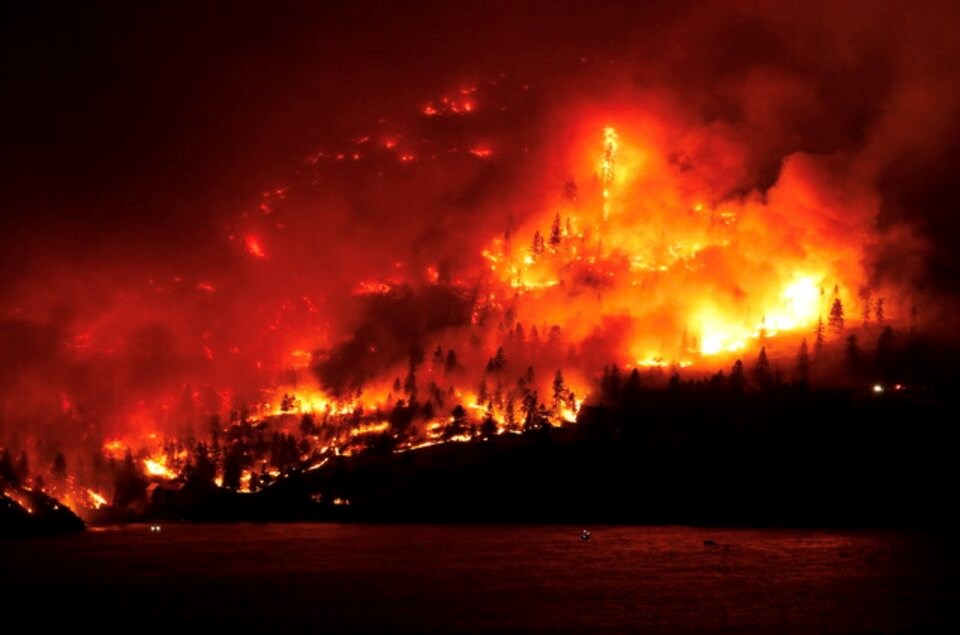B.C.'s premier is warning people not to tamper with critical firefighting equipment as crews battle hundreds of blazes across the province.
Reports of theft and individuals moving equipment emerged over the weekend in the Shuswap Lake area, where two massive wildfires have burned more than 50,000 hectares of land and damaged an untold number of structures.
“You're not helping if you're moving firefighter equipment. Firefighters are experts, the equipment is put there for a reason. And when it's not there when the firefighters go to get it, that is a big problem," Eby said at a Monday press conference.
“So please do not tamper with firefighter equipment."
Eby said RCMP is stepping up enforcement to prevent further thefts and movement of firefighting equipment.
27,000 British Columbians on evacuation order
In West Kelowna, where thousands of people have evacuated their homes due to the devastating McDougall Creek wildfire, at least 50 houses have been damaged and destroyed, according to a preliminary tally that does not yet include the worst-hit areas. An urban search-and-rescue team is working in the Kelowna area to further assess the damage, said Eby.
Across B.C., more than 27,000 people are now on evacuation order, with another 35,000 on evacuation alert, according to Bowinn Ma, minister of emergency management and climate readiness.
"We hope that the darkest days are behind us," said Ma. "But the situation is still evolving and the dangers we face are still extreme."
Ma called on British Columbians to prepare an emergency kit and grab-and-go bag so they can leave their home quickly should an evacuation order be declared.
The B.C. government has banned people from staying in temporary accommodation across the South Okanagan and Shuswap Lake regions. The order is meant to allow officials to prioritize lodging for evacuees and keep tourists out of the way of emergency responders.
"The last thing they need is disaster tourists coming and interfering with rescue efforts," Eby said.
North of the Kelowna fires, the Canadian Armed Forces is set to open its cadet camp in Vernon, B.C., to accommodate evacuees and as a strategic facility for firefighting operations, according to Ma.
Minister of Defence Bill Blair told reporters Monday that 38 Canadian Armed Forces personnel are in B.C. conducting reconnaissance in preparation for provisioning for air lift services, though the province has yet to request that kind of help.
BCWS appreciates support, clarifies controlled burns
Emergency officials praised many British Columbians for showing support to firefighters as they continue working through multiple deployments and personal hardships during B.C.’s most destructive wildfire season on record.
On Friday, Ma described firefighters with the BC Wildfire Service returning to burned camps and continuing to fight as they retreat. In another case, firefighters about 100 kilometres northeast of Kamloops in Scotch Creek lost their fire hall to wildfire and continue to fight on the front lines.
Cliff Chapman, director of operations for the BC Wildfire Service, said the organization has received letters, emails and phone calls of appreciation.
“I know that's happening locally within our fire camp as well, and even at gas stations when our crews are filling up their trucks,” said Chapman. “You have no idea how much this means to our organization and the people who are working in it. It is that type of recognition that keeps them going.”
Chapman also defended planned ignitions around the wildfires burning near Shuswap Lake, which he said have been the subject of public speculation.
“It protected hundreds of properties in the Shuswap area,” he said. “I also would like to just make one point of clarity that it was not our planned ignition that allowed the two fires in the Adams Lake area to merge.
“I am confident it was not our planned ignition that made that fire move into the North Shuswap. The winds were 40 kilometres an hour, sustained.”
Responding to concerns that the BC Wildfire Service is prioritizing the Kelowna fires at the expense of other parts of the province, Chapman said there are 385 firefighters at East Adams Lake fire north of Shuswap Lake and 164 firefighters at McDougall Creek wildfire in West Kelowna.
Chapman said the McDougall Creek fire is not experiencing the same intense behaviour seen in recent days. But around Shuswap Lake and in the Fraser Canyon, the wildfires continue to show “extreme fire behaviour,” Chapman said.
Smoke hampering aerial firefighting
Chapman said a heavy blanket of smoke has limited aerial firefighting resources in recent days.
“It's going to be touch and go how much we can fly in the next 12 hours — hoping that with a little bit of precipitation potentially coming that we may see that smoke clear and it'll allow us to get our aviation fleet back in the air,” he said.
There are 128 helicopters and 35 air tankers flying firefighting operations across the province. Chapman said if smoke clears and operations can start back up Monday, B.C. is likely to break a seasonal record as air tanker missions climb past 800 this year.
On the ground, 3,500 wildland firefighters are working across B.C. Forests Minister Bruce Ralston said an additional 100 Mexican firefighters are scheduled to arrive in the province on Wednesday, with another 200 South African firefighters arriving by the end of the week.
“The firefighting season isn't even close to being over yet," Ralston warned.



